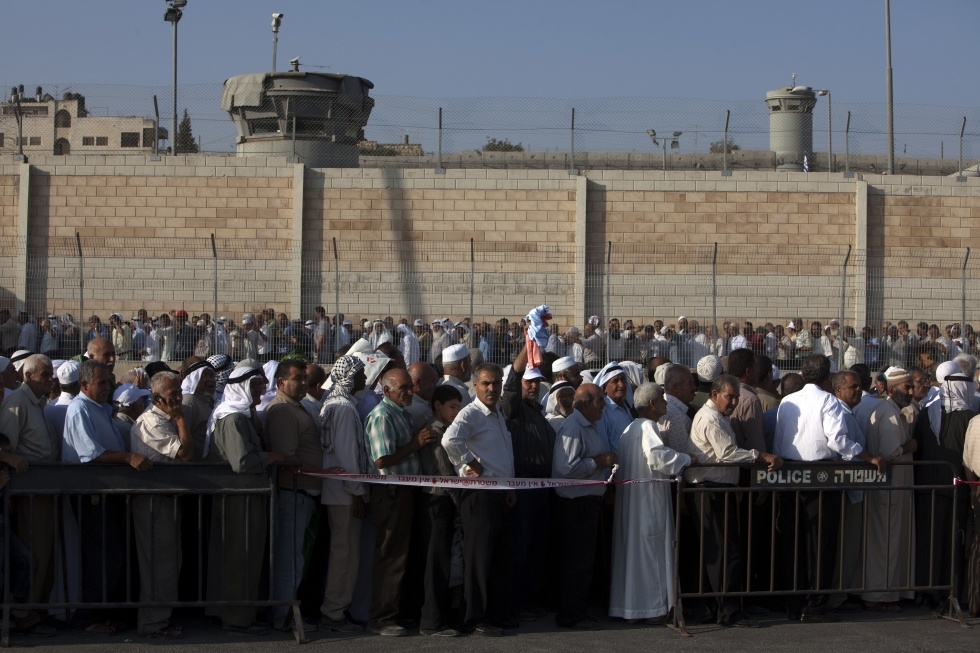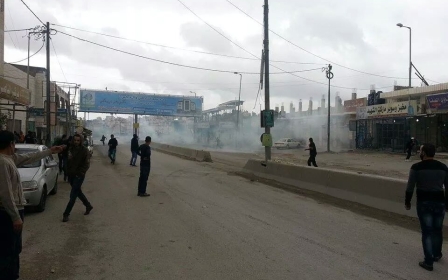Visa haze of doubt curbs West Bank NGOs

RAMALLAH - Non-governmental organisations across the West Bank regularly encounter unpredicted obstacles as they arrange for their international employees to enter Israel and work in the West Bank. NGOs argue that Israel’s entry and visa policies are ambiguous by design and are applied arbitrarily, resulting in a loss of staff. Some organisations sense they are subject to the whims of Israeli border authorities, against whose decisions they have limited avenues to appeal.
“If you’re looking for a coherent entry policy, you won’t find one,” said Sam Bahour, an American-born business consultant living in Ramallah. Bahour is founder of the Right to Enter movement. For NGOs wanting to secure entry or re-entry for foreign employees turned away at Israel’s borders, Right to Enter is often the first point of contact.
“As far as we’re concerned, it’s an arbitrary policy with no refined rules or regulations,” said Bahour. “Not only are there no clear rules or regulations that may or may not violate international law, there isn’t any kind of practise which is aligned with international standards.”
Ghassan Abdullah, coordinator for The Right to Enter Campaign, told the Mobility and Freedom of Movement Conference in Amman this year that: “Israeli [entry] procedures are arbitrary, unclear and non-transparent, varying from one case to the other.”
The Israeli Civil Administration's stated entry policy for the West Bank has in theory been thoroughly clarified in recent years, but many, including Bahour, argue that the policy has proved unreliable.
“We’ve overseen cases where people were denied entry and told not to come back for 10 years - they left for a week, came back, and got in,” said Bahour. “We’ve had people who were denied entry, came back after two, three, and four years and told they were still denied.”
Adi Lustigman, a Jerusalem-based lawyer who regularly represents those appealing against Ministry of Interior decisions, said: “According to the Oslo Accords, Israel is obligated to let people work and volunteer for NGOs or institutions in the West Bank.” Her point was echoed by Bahour. She added: “The exact policies of the Ministry of the Interior and many aspects of the policy are unclear.”
Lustigman said that, in particular, “there are no clear policies or guidelines for people who want to volunteer in the West Bank. There is no basic knowledge on what is allowed and what you are not allowed to do.”
According to Lustigman, this results in “many cases of people trying to hide the exact nature of their work. … The way Israel regards these policies - from my experience - is inconsistent. Sometimes they decide to enforce aspects of policy, sometimes they just overlook it. It’s very hard for someone to plan their work in order to do it legally.”
A senior official in Palestine’s Ministry of Interior, Ahmad Safi, said: “The Israeli authorities control movement, and access within the West Bank and into the West Bank, and the balance of power is entirely within the Israeli authorities’ hands.
“If international passport holders are coming to Israel to support the Israeli and Jewish communities, they won’t have any difficulty. But if Israeli border authorities understand that international visitors are coming to support Palestinian communities, Israeli authorities may make this very difficult for them.”
Safi, who oversees “hundreds” of cases monthly, said the Palestinian Ministry of the Interior maintains avenues to address individual cases with Israeli authorities, but reactions to queries are “slow and unconvincing”. Safi said of those hoping to enter Israel to work in the West Bank: “If they are coming from the Jordanian side, King Hussein Bridge, maybe it will be easier for them.”
Hadar Horen, a spokeswoman for the Israeli Coordination of Government Activities in the Territories (CoGAT), told MEE: "There is no basis for these claims. The unit for CoGAT has been working closely and in ongoing cooperation with international organisations through its assignment officers. These officers are in daily contact with the NGOs to assist promoting projects to improve the lives of the Palestinians in all fields: economy, technology, environment, health, etcetera.”
One NGO that has faced a losing struggle to bring its people into Israel is Paidia International Development, an NGO based in Beit Sahour focusing on outdoor adventure, leadership, and English language programmes. Over the course of one year, Paida’s core team of administrators and coordinators were denied entry, re-entry, or had their visas discontinued, until eventually the organisation was forced into closure. Founder Erich Strehl and his family were required to leave the region.
Strehl said: “The law firm we hired was a little taken aback by how inept the Israeli department that oversaw this particular [NGO] classification of visa was.”
Strehl, through his legal counsel, pursued the issue with the Israeli authorities until they told him: “We’re not taking any more applications or calls; give us a call back in six months.” He told Middle East Eye: “That’s how it ended.”
“Multiple times throughout that process our lawyers would call up, and say, ‘hey it’s been and a month-and-a-half, has there been any progress?’,” Strehl said, “and an administrator would say, ‘Oh, I forgot you guys were still actually pursuing that. Let me put it in the file for processing’.
“It became clear the department were either entirely inept or they just wanted you to give up and quit. Actually, I think it was quite a bit of both.”
Does Lustigman believe Israel's entry and visa policies are a deliberate attempt to put pressure on West Bank NGOs? “This sounds realistic. I have this impression. But it’s something that’s very hard to base upon evidence,” she said.
Paidia engaged around 750 adults and children in its development programs on an annual basis before its closure. But the impact of these policies is far reaching: The Edward Said Conservatory of Music, with branches across the West Bank and Gaza, Al-Haq, a prominent human rights observer group based in Ramallah, and Birzeit University are among organisations to have reported to MEE significant losses of staff due to “arbitrary” visa restrictions.
Since Israel applied to join the US visa waiver program - there are 36 participating countries - its visa and border policies in general have come under the scrutiny from the United States government. The visa waiver bill, S.266, met with controversy from US lawmakers since it was reported that Arab-Americans travelling to Israel and the Palestinian territories could - and have been - subject to discriminatory restrictions on access and movement.
The World Bank’s recent “Economic Monitoring Report to the Ad Hoc Liaison Committee” stated that the lifting of restrictions on movement and access for goods and people is “critical for a sustainable Palestinian economic future”. The report places the onus on the Israeli government to make “sincere efforts” to “allow better and faster movement of people and goods in, out and among the Palestinian territories, while taking into account legitimate security concerns of the Government of Israel”. The International Monetary Fund and the United Nations Conference on Trade and Development recently issued reports with similar calls to ease access restrictions.
“From a business perspective,” said Bahour, “if the quality of education is being reduced because of this policy, we in the private sector are receiving a pool of potential graduates who are below par, which affects our ability to do business at the level we want.”
Strehl said: “That should be what Israel wants to see - a developed and stable economy and educational system in Palestine. And what they’re doing is deteriorating away organisations that are trying to reach that end.
“It’s a loose, loose, loose situation. I’m not exactly sure how the Israeli government thinks this policy is to their benefit, unless it’s just vindictive - which it may be. I’m not sure what the logical trajectory of this is for the benefit of Israel.”
New MEE newsletter: Jerusalem Dispatch
Sign up to get the latest insights and analysis on Israel-Palestine, alongside Turkey Unpacked and other MEE newsletters
Middle East Eye delivers independent and unrivalled coverage and analysis of the Middle East, North Africa and beyond. To learn more about republishing this content and the associated fees, please fill out this form. More about MEE can be found here.




